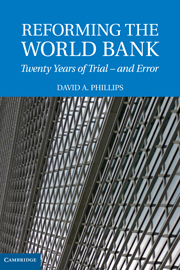Book contents
- Frontmatter
- Contents
- Preface: The Search for Effectiveness in the World's Premier Development Institution
- REFORMING THE WORLD BANK
- PART I ORIGINS AND EVOLUTION
- PART II THE SEARCH FOR EFFECTIVENESS
- 3 Fifty Years of Bank Reforms
- 4 The 1990s – Re-Engineering the Organization
- 5 Changing Culture and Changing People
- 6 Reforming the Bank's Assistance Product
- 7 Changing the Quality of Development Assistance
- 8 Financing the Reorganization
- 9 Why Did the Reforms Fail?
- PART III TOWARDS REAL REFORM: THE GOVERNANCE AGENDA
- Index
7 - Changing the Quality of Development Assistance
Published online by Cambridge University Press: 25 January 2011
- Frontmatter
- Contents
- Preface: The Search for Effectiveness in the World's Premier Development Institution
- REFORMING THE WORLD BANK
- PART I ORIGINS AND EVOLUTION
- PART II THE SEARCH FOR EFFECTIVENESS
- 3 Fifty Years of Bank Reforms
- 4 The 1990s – Re-Engineering the Organization
- 5 Changing Culture and Changing People
- 6 Reforming the Bank's Assistance Product
- 7 Changing the Quality of Development Assistance
- 8 Financing the Reorganization
- 9 Why Did the Reforms Fail?
- PART III TOWARDS REAL REFORM: THE GOVERNANCE AGENDA
- Index
Summary
As explained previously, the Bank's assistance focus has evolved in several stages, starting from the IBRD's initial role essentially as an investment banker financing infrastructure and then, with the IDA, moving into macroeconomic reform and increasingly into projects to develop skills, capacity, and institutional development, and in the process focus on advisory services and ‘knowledge products’ that are not necessarily combined with financing. This was an evolution that could also be described as a shift from hard to soft development products. The Strategic Compact aimed to both strengthen the Bank as a ‘soft’ knowledge provider and to improve the responsiveness and relevance of the Bank in both its hard and its soft offerings.
In addition to diversifying into new products that were more relevant to the needs of client countries, one of the principle undertakings of the Strategic Compact was to improve the quality and effectiveness of the Bank's products. The changes in these products during the reorganization period were ambitious, and, as we have seen, the shift has exposed numerous corporate strategic issues. Thus it is by no means clear yet that the Bank has established what new products are worthwhile or its comparative advantage in delivering them. Nevertheless, the Bank had to show improved quality and performance to justify the cost of its reorganization.
Regular and numerous claims were made of quality improvements. All the internal reviews made these claims with little qualification, and there were specific public statements that echoed these findings.
- Type
- Chapter
- Information
- Reforming the World BankTwenty Years of Trial - and Error, pp. 155 - 191Publisher: Cambridge University PressPrint publication year: 2009



